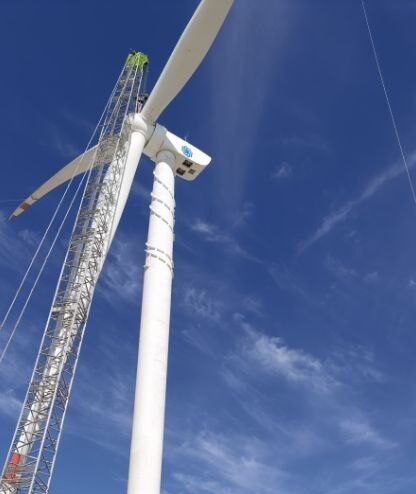Public finance alone cannot provide the investment needed for the global economy to move towards and achieve net zero. Policy, projects, and financing solutions are needed to mobilise private capital. On finance day at COP28, the Net-Zero Banking Alliance is highlighting recent case studies from member banks where the blending of public and private finance was key to their success. The case studies are taken from the NZBA 2023 Progress Update.
First Abu Dhabi Bank plays key role in financing of Central Asia’s largest renewable project
In 2022, First Abu Dhabi Bank (FAB) played a leading role in financing the 500-megawatt Zarafshan wind project, the first wind power project in Uzbekistan and the largest renewable project in Central Asia to date. FAB acted as green loan coordinator, structuring bank, bookrunner and mandated lead arranger on a USD 102 million green loan facility. The facility was backed by Etihad Credit Insurance (ECI), UAE’s export credit agency. The project also received over USD 175 million in long-term loan facilities from four development finance institutions.
The wind farm is expected to avoid 1.1 million tonnes of CO2 emissions per year, power 500,000 homes, and contribute to Uzbekistan’s target of generating 25% of its electricity from renewables by 2030.
Zarafshan is the first wind project financed by FAB. The bank’s underwriting of half of the ECI-backed facility counts towards its goal to lend, invest, and facilitate business of USD 75 billion by 2030 for environmental and socially responsible activities.
Read more on FAB’s net-zero targets
Bank of America supports restructuring of Gabon’s sovereign debt for nature-positive outcomes
In August 2023, the Government of Gabon, The Nature Conservancy and Bank of America announced the completion of the first ‘Debt-for-Nature’ transaction in mainland Africa and Africa’s first ever involving private creditors. The USD 500 million refinancing of Gabon’s sovereign debt will free up an expected USD 125 million for ocean conservation projects, supporting Gabon’s ambitious national effort to protect 30% of its lands, freshwater systems, and ocean by 2030. The transaction benefitted from political risk insurance of up to USD 500 million provided by the US International Development Finance Corporation which resulted in a Aa2 investment grade rating for the transaction. This attracted investors, enabled issuance of longer duration debt than would be typically achievable for Gabon, and lowered its interest payments. Bank of America acted as sole initial purchaser, structuring agent, and bookrunner on this debt-for-nature conversion.
This transaction will enable Gabon to make annual contributions to a conservation fund and endowment that will continue to fund conservation after the bonds are repaid. It forms part of Bank of America’s goal, announced in 2021, to mobilise and deploy USD 1.5 trillion in sustainable finance by 2030 of which USD 1 trillion is for the environmental transition.



